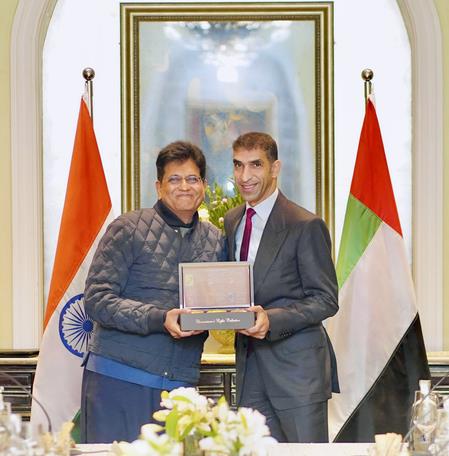India, UAE Eye $100 Billion Non-Oil Bilateral Trade Target
The issue was discussed at a meeting held by Union Minister of Commerce & Industry Piyush Goyal, with the UAE's Minister of Foreign Trade, Thani bin Ahmed Al Zeyoudi, last week on further deepening the India–UAE Comprehensive Economic Partnership Agreement (CEPA), according to an official statement issued on Monday.
The ministers reviewed the progress made under the CEPA and reaffirmed the shared vision of expanding bilateral trade towards the target of $100 billion non-oil, non-precious metals trade by 2030. Discussions included collaboration in emerging sectors such as renewable energy, digital infrastructure, supply chain resilience, and healthcare.
Both ministers emphasised the importance of working closely in the current global scenario to strengthen the bilateral economic partnership. Goyal highlighted the resilience and inherent strengths of the Indian economy, which have enabled it to surge ahead during challenging times. The ministers agreed on the importance of working with diverse partners for mutual benefit.
Both sides underlined the need for timely trade data sharing for better monitoring under the CEPA and agreed that the Sub-Committee on Services will convene within two months. The Indian side welcomed the formation of the Emirates Drug Establishment and its role in addressing concerns of Indian pharmaceutical companies. On market access and regulatory issues, both ministers agreed to take up matters for early resolution in the CEPA Joint Committee.
Goyal welcomed the UAE's growing investments in India's infrastructure, logistics, and food processing sectors, and appreciated Dr Thani's leadership in advancing multilateral trade cooperation. The ministers noted the importance of initiatives such as the Local Currency Settlement System (INR–AED) and Bharat Mart in the UAE as enablers of trade facilitation. The meeting underscored the India–UAE partnership as a defining alliance of the 21st century, rooted in innovation, sustainability, and shared prosperity.
The two ministers also co-chaired stakeholder meetings with representatives of the pharmaceutical and food sectors. In the pharma sector, key issues were discussed in light of evolving geopolitical challenges. Both sides exchanged views on ways to further facilitate trade in pharmaceuticals and healthcare products. The UAE side conveyed a positive outlook on expediting registration processes and regulatory facilitation, while the Indian side highlighted its openness and readiness for inspections and audits by UAE authorities. Discussions also focused on emerging opportunities in traditional medicine, with special emphasis on ayurvedic products under the India–UAE partnership.
In the food sector, the APEDA launched the Bharati Scheme to incubate food and agritech start-ups, under which more than 100 companies will be supported to build and scale brands and forge business-to-business tie-ups. The APEDA also signed an MoU with DWTC to have India as the partner country in the 2026 edition of Gulf Food, Dubai. Over 1200 sqm of exhibition space will be allocated to Indian companies in the food, marine, tea, coffee and spices segments. The UAE side addressed concerns of the Indian food and beverages industry, including issues relating to high retail prices, price norms and mandatory testing for rice consignments.

Legal Disclaimer:
MENAFN provides the
information “as is” without warranty of any kind. We do not accept
any responsibility or liability for the accuracy, content, images,
videos, licenses, completeness, legality, or reliability of the information
contained in this article. If you have any complaints or copyright
issues related to this article, kindly contact the provider above.
Most popular stories
Market Research

- Microgrid Market Growth, Key Trends & Future Forecast 2033
- Nickel Market Estimated To Exceed USD 55.5 Billion By 2033
- Primexbt Launches Empowering Traders To Succeed Campaign, Leading A New Era Of Trading
- Chaingpt Pad Unveils Buzz System: Turning Social Hype Into Token Allocation
- Ecosync & Carboncore Launch Full Stages Refi Infrastructure Linking Carbon Credits With Web3
- Japan Halal Food Market Size To Surpass USD 323.6 Billion By 2033 With A CAGR Of 8.1%






















Comments
No comment